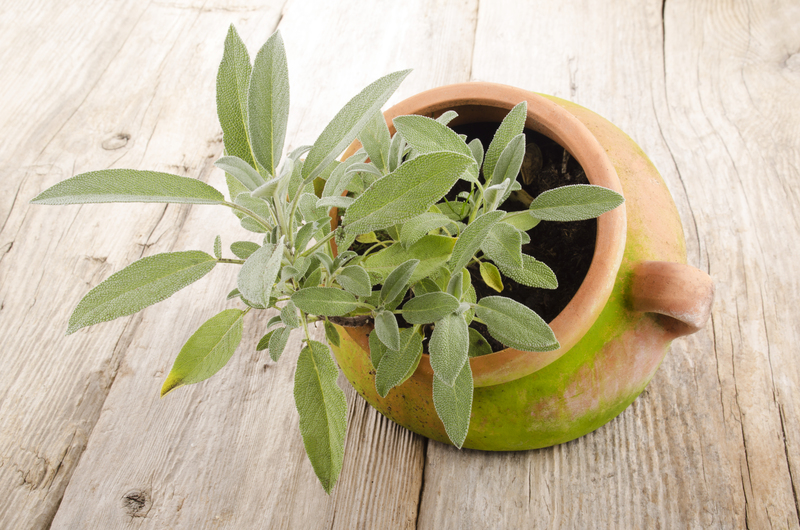Enriching Soil with Nutrients from Organic Waste Recycling
Posted on 13/09/2025
Enriching Soil with Nutrients from Organic Waste Recycling
Making your soil more fertile and productive is a crucial goal for gardeners, farmers, landscapers, and anyone interested in sustainable land management. Enriching soil with nutrients from organic waste recycling offers a powerful, eco-friendly method to boost soil health, reduce landfill waste, and create a thriving ecosystem for plants and beneficial organisms. This comprehensive guide explores the many facets of transforming organic waste into rich, productive soil--covering techniques, benefits, types of organic waste suitable for recycling, and practical tips for success.
Why Focus on Organic Waste Recycling for Soil Enrichment?
Globally, food scraps, yard trimmings, and other organic materials account for a significant portion of household and agricultural waste. Sending these materials to landfills not only wastes potential nutrients but also contributes to methane emissions--a potent greenhouse gas. Recycling organic waste transforms what would become a pollutant into a valuable resource for nutrient enrichment in soils.
The Importance of Healthy Soil
- Supports Plant Growth: Nutrient-rich soil provides essential macronutrients and micronutrients for crops, flowers, and trees.
- Improves Water Retention: Organic matter enhances the soil's ability to hold moisture, reducing irrigation needs.
- Promotes Biodiversity: Healthy soils teem with fungi, bacteria, earthworms, and other microfauna, creating a robust ecosystem.
- Reduces Erosion: Well-structured soils resist wind and water erosion, protecting landscapes and agriculture.
Organic Waste Recycling Defined
Organic waste recycling involves the collection and biological processing of previously discarded natural materials, such as food scraps, plant trimmings, coffee grounds, and paper. The primary aim is to convert this waste into compost or organic fertilizers that enrich soil naturally and safely.

Main Sources of Organic Waste for Soil Enrichment
To maximize the benefits of soil enrichment, it's helpful to understand the various types of organic waste that can be safely and effectively recycled in your garden or farm.
- Food Scraps: vegetable peels, fruit rinds, eggshells, coffee grounds, bread, grains, and more.
- Yard Trimmings: grass clippings, leaves, branches, and prunings.
- Paper Products: non-glossy paper, napkins, paper towels (free of chemicals), cardboard pieces.
- Animal Manure: from herbivorous animals such as cows, chickens, goats, horses (never from cats or dogs).
Combining these waste streams thoughtfully enables a balance of carbon and nitrogen that is vital for microbial activity and effective nutrient release in the soil.
Composting: Core Method to Enrich Soil with Nutrients from Organic Waste
What is Composting?
Composting is the biological breakdown of organic waste into a dark, earthy material called compost. This process is powered by bacteria, fungi, and invertebrates, all working in concert to recycle nutrients naturally.
Key Steps in the Composting Process
- Collection: Gather a mix of "greens" (nitrogen-rich materials) and "browns" (carbon-rich materials).
- Layering: Alternate layers of greens and browns to maintain proper airflow and nutrients balance.
- Moisture Management: Keep the pile as damp as a wrung-out sponge--too much water leads to bad odors, too little slows decomposition.
- Aeration: Turn the pile regularly to introduce oxygen, which encourages aerobic decomposition and discourages pests.
- Maturation: Allow the mixture to rest and finish breaking down. Finished compost is dark, crumbly, and has an earthy smell.
Best Practices for Composting
- Balance Carbon to Nitrogen (C:N Ratio): Aim for about 30:1 by weight (browns to greens).
- Avoid Meat, Dairy, and Grease: These items can attract pests and create odor problems.
- Chop or Shred Materials: Smaller pieces break down faster, ensuring a uniform, high-quality compost.
- Watch for Weeds and Diseased Plants: Only compost healthy trimmings to avoid spreading problems in your soil.
Properly managed composting transforms organic waste into a potent, slow-release soil amendment packed with essential nutrients and beneficial microbes.
Major Nutrients Provided by Organic Waste Recycling
When you enrich soil with nutrients from organic recycling, you supply a diverse range of elements that plants need for optimal growth and productivity. The main nutrients include:
- Nitrogen (N): Vital for leaf and stem growth, found abundantly in fresh grass clippings, food scraps, and manures.
- Phosphorus (P): Important for root development and flowering, present in decomposing plant material, bone meal, and some manures.
- Potassium (K): Promotes overall plant health and disease resistance, found in banana peels, wood ash, and certain composted materials.
- Secondary Nutrients: Calcium, magnesium, and sulfur--essential for cell wall integrity, chlorophyll, and protein formation.
- Micronutrients: Iron, manganese, copper, zinc, molybdenum, and boron in trace but crucial amounts.
Organic matter also improves soil structure, increases water-holding capacity, and supports the microbial life that makes nutrients available to plants.
Benefits of Enriching Soil with Organic Waste Recycling
Environmental and Economic Advantages
- Reduces Landfill Waste: Diverts food and yard waste from landfills, preventing methane emissions and reducing municipal disposal costs.
- Builds Healthier Soils: Boosts fertility, structure, and resilience for gardens, lawns, farms, and natural areas.
- Improves Food Security: Healthy, productive soils support robust local food systems.
- Saves Money: Reduces or eliminates the need for commercial fertilizers and soil conditioners.
- Enhances Carbon Sequestration: Soils rich in organic matter store more carbon, helping to fight climate change.
Soil Health Improvements
- Enhances Microbial Diversity
- Increases Beneficial Fungi and Earthworms
- Improves Soil Aggregation and Structure
- Prevents Hardpan and Surface Crusting
- Reduces Erosion and Runoff
Different Techniques for Recycling Organic Waste into Soil Nutrients
Traditional Composting
The classic method involves creating a compost pile or heap, usually outdoors, with regular turning and maintenance. This method is effective for most homeowners and small-scale farmers.
Vermicomposting (Worm Composting)
Vermicomposting uses specific types of worms (like Eisenia fetida, or red wigglers) to break down food scraps and other organic materials. The result is a highly nutrient-rich soil amendment known as worm castings or vermicompost.
- Advantages: Fast decomposition, minimal odor, compact systems suitable for indoor use.
- Limitation: Avoid adding citrus, meats, or oily foods.
Bokashi Fermentation
Bokashi is an anaerobic process (without oxygen) that ferments food scraps using special microbes. The fermented material can then be incorporated into the soil or a compost pile.
- Speeds up decomposition.
- Reduces odors and pests.
- Allows inclusion of meat and dairy waste.
Green Manuring
Instead of discarding plant trimmings, you can grow cover crops such as peas, clover, or vetch, then till them directly into the soil, recycling nutrients "in place."
Mulching with Organic Materials
Applying layers of dried leaves, grass clippings, or chopped straw acts as a "slow-release" organic fertilizer. Over time, the mulch breaks down and enhances soil fertility.
How to Apply Organic Waste-Derived Nutrients to Soil
To maximize plant health and soil vitality, proper application methods are crucial.
Incorporating Compost
- Top-Dressing: Spread a 1-2 inch layer of compost over existing beds or lawns each season.
- Tilling In: Mix compost into the top 4-6 inches of soil before planting to boost root zone fertility.
- Potting Mix Addition: Blend compost with garden soil and sand for container plants.
- Tree and Shrub Plantings: Add a shovelful of compost to holes during planting for better establishment.
Timing Your Applications
- Spring: Bolsters rapid growth as plants emerge from dormancy.
- Fall: Protects soil over winter and prepares beds for spring planting.
Common Challenges in Organic Waste Recycling for Soil Enrichment
Pests and Odors
Many new composters struggle with rodents, flies, and foul smells. Solutions: Bury food waste deep within the pile, maintain proper moisture and aeration, and avoid including animal products.
Compost That Won't Break Down
Larger pieces, lack of nitrogen, or dry conditions can slow decomposition. Chop materials finely and check moisture levels.
Weed Seeds and Pathogens
A hot compost pile (130-150°F) kills most weed seeds and harmful pathogens. Turn your pile frequently to ensure even heating.
Heavy Metals and Chemical Residues
Avoid composting treated wood, glossy paper, or lawn clippings from chemically treated lawns.
Organic Waste Recycling in Urban vs. Rural Settings
City Gardens and Small Lots
Space-efficient systems like worm bins, bokashi buckets, and tumbler composters are ideal. Community composting programs are increasingly available.
Farms and Large Landscapes
Farms generate substantial organic waste--crop residues, animal manures, and more. Windrow or static pile composting, sheet mulching, and green manuring can process high volumes.
Enriching Soil with Organic Waste: Step-by-Step Guide
- Start with Good Materials: Only use safe, plant-friendly organic waste.
- Compost Thoroughly: Allow enough time for complete breakdown--at least 3-6 months for traditional compost.
- Test Your Compost: Finished compost should be dark, crumbly, and free of recognizable food scraps or foul odors.
- Apply Properly: Top-dress, till, or mulch with your compost according to your soil and crop needs.
- Monitor Results: Observe plant health, growth rates, and soil structure. Make adjustments if needed.
Frequently Asked Questions about Soil Enrichment Using Organic Waste
-
Can any organic material be composted for soil enrichment?
No. Always avoid plastics, glass, chemically treated wood, glossy or colored paper, and animal waste from pets. -
How often should I apply compost?
At least once a year (spring or fall). Highly productive gardens benefit from a second light application mid-growing season. -
Is compost alone enough for healthy soil?
Compost improves soil, but some soils may require specific mineral amendments based on soil testing results. -
Does organic waste recycling eliminate the need for synthetic fertilizers?
It can dramatically reduce or eliminate reliance on synthetic fertilizers over time, but transition gradually and monitor plant health closely.

Sustainable Future: The Broader Impact of Organic Waste Recycling in Soil Enrichment
By choosing to enrich soil with nutrients from recycled organic waste, gardeners, farmers, and communities make a powerful contribution to environmental health, climate resilience, and food security. The practice closes resource loops, reducing pollution and building the foundation for thriving, sustainable landscapes.
Start small or scale up--every compost bin, worm farm, and mulch pile brings us closer to healthier soils and a healthier planet.
Conclusion: Nurture Your Soil, Nourish the Earth
Enriching soil with nutrients from organic waste recycling is a time-tested, cost-effective strategy to foster soil vitality, productive gardens, resilient farms, and beautiful landscapes. With numerous options ranging from backyard composting to community-wide initiatives, anyone can participate in this meaningful movement. Start embracing organic waste recycling for soil enrichment today--and watch your plants, and the planet, flourish!
Latest Posts
Breathing Life into Your Neglected Garden
Elevate Your Greenery with Creative Container Gardening Techniques
Vertical Gardening: A Modern Approach to Green Spaces

